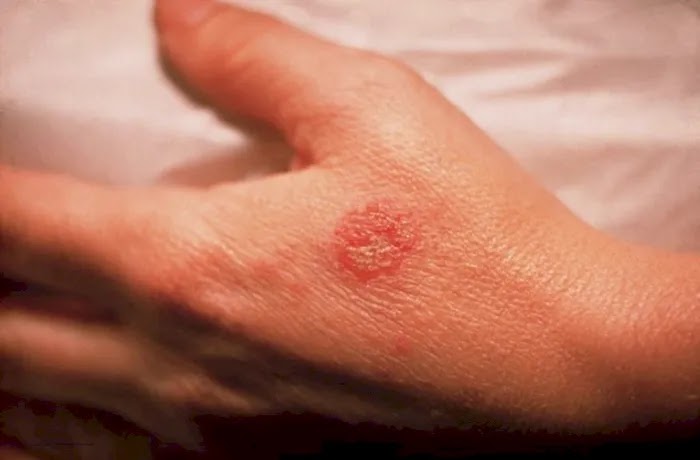7 Causes of Dry Skin and How to Overcome It
Dry skin is a skin condition that is scaly, itchy and cracked. This skin condition can affect any part of the body, such as the hands and feet. There are various causes of dry skin, such as psoriasis, eczema, water fleas, and others.
Generally, lifestyle changes and moisturizers can treat dry skin. Well, here are some causes of dry skin and how to overcome them. Check out the explanation below.
1. Psoriasis
If you have red silvery patches on your knees, elbows, lower back or scalp, then you may have psoriasis. One symptom of psoriasis is dry, cracked skin that bleeds or itch.
Mona Gohara, MD, associate clinical professor of dermatology at Yale School of Medicine, explains that T cells, one of the body's immune cells, signal the skin to overproduce certain chemicals.
According to the National Psoriasis Foundation, about a third of people with psoriasis have a family member who has psoriasis as well. There is no cure for this disease, but consulting a dermatologist can help to treat psoriasis.
2. Eczema
Red, scaly or crusty patches that are very itchy are usually eczema. According to the National Eczema Association, people with eczema tend to have very dry skin due to mutations in a gene that controls filaggrin (a protein that keeps skin moist and prevents bacteria from entering the skin).
Eczema can get worse due to exercise that triggers excessive sweating, constant scratching and stress. According to the doctor's instructions, eczema treatment can be done with light therapy, immunosuppressant drugs, and moisturizers.
3. Dryness of the skin
Dry skin can occur because the skin loses its ability to retain water (usually with age). In addition, cold weather and hot weather also cause dry skin.
Mona Gohara, MD, associate clinical professor of dermatology at Yale School of Medicine, suggests using a moisturizer containing ceramide, cholesterol and hyaluronic acid as a real solution to prevent dry skin. Bathing with a shorter duration and applying sunscreen ( sunscreen) every day also helps prevent dryness of the skin.
4. Allergies
Many things can cause allergies to the skin (allergic contact dermatitis), such as perfume and hair dye. According to the CDC (Centers for Disease Control and Prevention), about 10-20% of people are sensitive to nickel, a common cause of allergic contact dermatitis.
Mona Gohara, MD, associate clinical professor of dermatology at Yale School of Medicine, says it's difficult to identify a nickel allergy because sometimes an allergic reaction doesn't appear right away. Usually, a dermatologist will do a Skin Patch Test to determine whether you are allergic to nickel or not.
Nickel can be found in zippers, jewellery, belts, eyeglass frames and cell phones. To avoid exposure to nickel on your skin, buy nickel-free jewellery, belts and eyeglass frames, protect your phone with a case and replace nickel zips with plastic ones.
5. Hypothyroidism
An underactive thyroid gland (hypothyroidism) can affect many parts of the body, including the skin. The thyroid gland is a small gland located at the bottom of the neck. This gland functions to produce hormones that regulate the body's metabolism. The thyroid gland produces fewer hormones, making the skin dry and rough.
Generally, the thyroid gland cannot produce enough hormones due to autoimmune diseases such as Hashimoto's disease (the immune system attacks the thyroid gland). You can consult a doctor for a series of blood tests to make sure your thyroid gland is underactive.
6. Sunburned skin
Dry and peeling skin is most often caused by sunburn. Steven Wang, MD, director of dermatologic surgery and dermatology at Memorial Sloan-Kettering Cancer Center, Basking Ridge, explains that flaky skin from sunburn may not be a good thing. Still, it's the body's way of getting rid of cells damaged by UV rays.
If you experience a sunburn, cool the skin by applying a cold compress or taking a cold shower. To avoid sunburn, apply sunscreen ( sunscreen) with SPF 30 or more, use a hat, sunglasses and closed clothing.
7. Water fleas
Brian Adams, MD, a dermatologist in Cincinnati, says that the warm, dark, and damp environment inside shoes is perfect for mould to grow. This condition is very common between the toes, although it can spread throughout the foot. Fungus on the feet can cause the skin to become red, flaky, dry and itchy.
Keep your feet dry and use an antifungal cream to get rid of the yeast infection. To make sure the skin is completely free of fungi, you need to treat the water fleas for 1-2 weeks after the rash disappears, according to the instructions for using the drug. If you have treated water fleas but do not heal, you should consult a dermatologist.
Those are seven causes of dry skin and how to overcome them. It turns out that dry skin is not only caused by the weather but also by disease. Make sure you stay alert and consult a doctor if your skin condition worsens.








